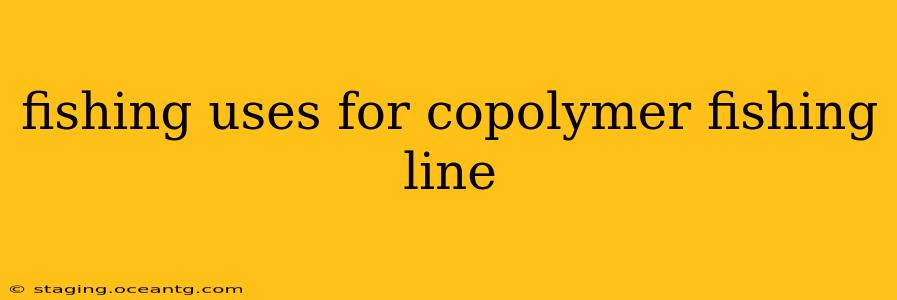Copolymer fishing line, a blend of different polymers like nylon and ethylene-vinyl acetate (EVA), offers a unique set of properties that make it a versatile choice for anglers. It strikes a balance between strength, flexibility, and abrasion resistance, making it suitable for a wide variety of fishing applications. This guide explores the various uses of copolymer fishing line, addressing common angler questions.
What are the advantages of copolymer fishing line?
Copolymer fishing line boasts several advantages over other types of lines. Its blend of polymers creates a line that is both strong and relatively abrasion-resistant. This means it can withstand the rigors of casting and fighting fish, especially in environments with rocky bottoms or heavy vegetation. It also offers good knot strength and maintains a manageable level of stretch, making it suitable for a range of fishing techniques. Compared to monofilament, it often boasts improved castability due to its smoother surface.
What type of fishing is copolymer line best for?
Copolymer fishing line's versatility shines through in its adaptability to numerous fishing styles. Its balanced properties make it a strong contender for:
- Spin fishing: The blend of strength and flexibility makes it ideal for casting lures and retrieving them smoothly, especially when dealing with medium-sized fish.
- Bait fishing: Copolymer's ability to handle heavier weights and resist abrasion makes it suitable for bottom fishing with live bait or heavier lures.
- Light tackle fishing: Although not as sensitive as fluorocarbon, copolymer provides adequate sensitivity for detecting subtle bites in lighter tackle applications.
- Dock fishing: Its abrasion resistance is beneficial in situations where the line frequently rubs against docks, pilings, or other structures.
Is copolymer line good for saltwater fishing?
While copolymer fishing line can be used in saltwater, its performance isn't as durable as specialized saltwater lines. Saltwater's corrosive nature can degrade the line faster than in freshwater. While it will certainly perform adequately for many saltwater scenarios, it’s not the ideal choice for extended periods or aggressive saltwater fishing.
How does copolymer line compare to monofilament?
Copolymer and monofilament lines are both popular choices, but they differ in several key aspects. Copolymer generally offers superior abrasion resistance and knot strength compared to monofilament. However, monofilament might have a slight edge in terms of sensitivity and overall price. The choice often depends on the specific fishing situation and angler preference.
What are some drawbacks of copolymer fishing line?
While copolymer fishing line presents several advantages, it also has some limitations. Its abrasion resistance, while improved over monofilament, is not as high as fluorocarbon. Additionally, prolonged exposure to UV light can degrade the line over time, reducing its strength and lifespan. Finally, the memory of the line can be a minor concern for some anglers, especially in cold conditions.
How long does copolymer fishing line last?
The lifespan of copolymer fishing line depends on several factors, including the frequency of use, environmental conditions, and the quality of the line. Generally, it's recommended to replace your line periodically, even if it doesn't show visible signs of damage, to ensure optimal performance and reliability. Regular inspection for nicks, abrasions, and weakened areas is highly recommended.
Which copolymer fishing lines are recommended?
Several reputable fishing line brands produce high-quality copolymer lines. Researching and selecting a line that matches your specific needs and budget is crucial. Reading reviews and comparing specifications can help you choose the optimal line for your fishing style. Paying close attention to the stated line strength and diameter is vital for ensuring the proper balance for your angling needs.
By understanding the characteristics and applications of copolymer fishing line, anglers can make informed decisions and improve their overall fishing experience. Remember that proper line maintenance and regular inspection are key to maximizing its lifespan and performance.
